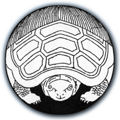Another summer, another sesshin. The Japanese word "sesshin" means "touching the mind" or "joining the heart." It's a week-long Zen meditation retreat, and I've been doing this one at Samish Island for several summers now. There were about fifty people this year, which was a big group, so the energy was pretty strong. We sat zazen from Sunday to Friday, then on Friday evening we did a Jukai ceremony. "Jukai" (Receiving the Precepts) is the Zen lay ordination ceremony. There were three of us ordaining, and in the ceremony we received the sixteen bodhisatva precepts, our rakusu (a mini-version of Buddha's robes, which we had each sewn), our lineage papers (connecting us back, through time, to the historical Buddha), and our new Buddhist names.
The power of the ceremony took me by surprise. When I was growing up, my family didn't do religion. We were a small, nuclear unit of mixed cultural heritage. My parents were social scientists and secular rationalists: my mother, a linguist; my dad, an anthropologist. As a child, I remember observing, with a kind of anthropological detachment, other families celebrate their rituals, but I always felt acutely embarrassed when I was called upon to participate in any kind of religious ceremony myself. Even Christmas made me feel somewhat fraudulent. So I was nervous about the jukai ceremony—I hoped it would be nice, that it would go off smoothly, that we wouldn't screw it up too badly—but I never expected it to be so deeply moving. And moving is exactly the word for it. When we entered the zendo and approached the altar, it felt quite literally like we were stepping into a stream, whose current would carry us, and there was no need to be nervous or anxious or anything else. It was so much bigger and stronger and older and longer than any of us, and we were just these little motes or particles in the current, bobbing and flowing along. It was a powerful feeling. There's something to be said for a 2500 year old tradition. It puts things into perspective.
But religion aside, I'm always awed by the effectiveness of formal meditation as a technology for studying the mind. In the retreat, we do very little. We sit, we walk, we listen, we work, we chant, we eat. But everything feels brighter and lighter and more spacious after sesshin, like you really have touched, however briefly, the mind of the world, and rejoined it at its heart.
 walking meditation
walking meditation
